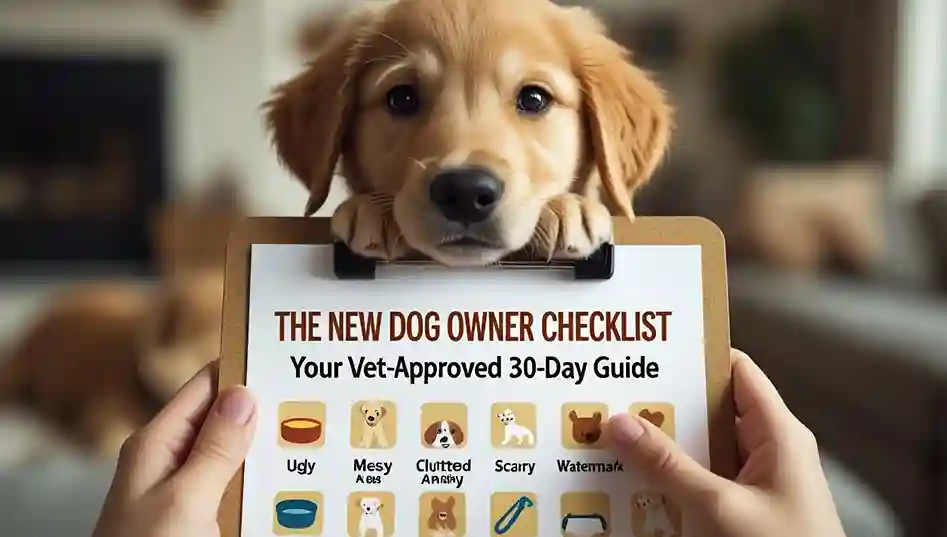Bringing your new puppy home is an exciting milestone, followed closely by one of the most important responsibilities of pet ownership: ensuring they are protected against dangerous diseases. Navigating the puppy vaccination schedule can feel complex, but it’s a fundamental part of the healthcare section in our ultimate New Dog Owner Checklist that safeguards their health for years to come. These shots are carefully timed to work with your puppy’s developing immune system, creating a shield against serious illnesses like Parvovirus and Rabies.
This comprehensive, vet-reviewed guide breaks down the entire vaccination timeline into a clear, easy-to-follow plan. We’ve collaborated with Dr. Allona Jackson, DVM, to explain which vaccines are essential, when they should be administered, and what you can expect at each vet visit. You’ll learn about core versus non-core vaccines, understand the associated costs, and get answers to common questions about safety and side effects.
Consider this your trusted, all-in-one resource for navigating your puppy’s vaccination journey with confidence. Let’s ensure your newest family member gets the healthy start they deserve.
Key Takeaways: Puppy Vaccination Schedule
Before we dive into the detailed timeline, here are the most critical, vet-approved facts about puppy vaccinations. These principles will help you understand the “why” behind the schedule.
- 🛡️ Core vs. Non-Core Vaccines: Core vaccines (like DHPP and Rabies) are essential for all puppies, while non-core vaccines (like Bordetella or Leptospirosis) are given based on your puppy’s lifestyle and local disease risks.
- 📅 The Series is Non-Negotiable: Vaccinations aren’t a one-time event. They are given in a series of shots every 3-4 weeks from 6-8 weeks of age until at least 16 weeks old to ensure complete protection.
- 👩👦 Maternal Antibodies Complicate Timing: Puppies get temporary immunity from their mother. The vaccination series is timed to activate just as this protection fades, creating a seamless shield.
- 📝 Keep a Vaccine Record: Your veterinarian will provide a vaccination record. This document is crucial for proof of care and is often required for grooming, training classes, and boarding facilities.
- 💬 Lifestyle Dictates Need: An open conversation with your vet about your puppy’s environment (e.g., plans for dog parks, boarding, or hiking) is essential to determine the right non-core vaccines for their protection.
“At a Glance” Comparison Table: Core Puppy Vaccines
| Vaccine | Abbreviation | Protects Against | Key Schedule Notes |
|---|---|---|---|
| Distemper, Hepatitis, Parainfluenza, Parvovirus | DHPP (or DAPP) | A combination vaccine for several serious, often fatal viruses including canine distemper and parvovirus. | The cornerstone of the schedule. Given every 3-4 weeks from 6-8 weeks to 16-18 weeks. |
| Rabies | Rabies | A fatal viral disease that affects the nervous system and can spread to humans. | Typically given once at 12-16 weeks, with a booster in one year. Required by law in most regions. |
| Bordetella | “Kennel Cough” | A highly contagious respiratory infection causing a persistent cough. | Often required for boarding, grooming, or daycare. Can be given as early as 6-8 weeks, with boosters every 6-12 months. |
| Leptospirosis | Lepto | A bacterial disease spread through water and soil that can cause liver and kidney failure. | Often included as a core vaccine in many areas due to rising prevalence. Given in two doses, 2-4 weeks apart. |
Why Vaccinations Are Non-Negotiable for Your Puppy
Understanding the science behind vaccinations helps you appreciate why this schedule is so critical for your puppy’s health and longevity.
How Puppy Immunity Works: Maternal Antibodies & The “Window of Vulnerability”
Newborn puppies receive temporary immunity from their mother’s first milk (colostrum). These maternal antibodies protect them initially but also neutralize vaccines if given too early. As these antibodies gradually fade, they create a “window of vulnerability” where the puppy is no longer protected by mom but isn’t yet fully protected by vaccines. The carefully timed vaccination series is designed to fill this gap, providing protection exactly when maternal immunity wanes but before puppies are exposed to dangerous pathogens.
Herd Immunity: Protecting Your Puppy and the Community
Vaccinations don’t just protect individual animals—they protect entire communities through herd immunity. When a high percentage of dogs in a population are vaccinated, disease transmission is effectively stopped, creating a protective barrier that helps safeguard puppies who are too young to be fully vaccinated, elderly dogs with declining immunity, and animals that cannot be vaccinated for medical reasons. By vaccinating your puppy, you’re contributing to community-wide protection against deadly diseases like parvovirus and distemper.
Your Month-by-Month Puppy Vaccination Schedule
This timeline provides a general framework for your puppy’s vaccination series. Always follow your veterinarian’s specific recommendations, as they may adjust based on your puppy’s health, breed, and local disease prevalence.
6-8 Weeks: First Vet Visit & Initial Protection
This initial visit typically includes the first DHPP shot (protecting against Distemper, Hepatitis, Parainfluenza, and Parvovirus). Your veterinarian will also perform a thorough physical examination, discuss deworming, and provide guidance on nutrition and care. This is the perfect time to ask questions about your puppy’s overall health and development.
10-12 Weeks: Building Stronger Immunity
During this visit, your puppy will receive their second DHPP booster. Depending on your location and your puppy’s lifestyle, your vet may also recommend the Bordetella (kennel cough) vaccine and the first dose of the Leptospirosis vaccine. This stage is crucial for building a stronger immune response.
14-16 Weeks: Final Core Boosters & Rabies
This is a critical visit where your puppy receives their final DHPP booster, ensuring full protection. They will also typically receive their first Rabies vaccination, which is required by law in most areas. Depending on the protocol, a second Leptospirosis booster may also be given. After this visit, your puppy can safely begin interacting with other vaccinated dogs in public spaces.
| Age | Core Vaccines | Non-Core Vaccines | Key Health Considerations |
|---|---|---|---|
| 6-8 Weeks | First DHPP shot | Bordetella (if needed early for boarding) | First vet check-up, deworming, nutrition consultation |
| 10-12 Weeks | Second DHPP booster | Leptospirosis (first dose), Bordetella | Health assessment, discuss socialization opportunities |
| 14-16 Weeks | Third DHPP booster, Rabies vaccine | Leptospirosis (second dose), Lyme (if in endemic area) | Final core vaccination round, legal rabies requirement met |
| 12-16 Months | DHPP booster, Rabies booster | All non-core vaccine boosters | Transition to adult vaccination schedule, health assessment |
Note: This is a general guideline. Your veterinarian may recommend a slightly different schedule based on your puppy’s specific needs and local disease risks.
Understanding Vaccine Costs & What to Ask Your Vet
Being prepared for the financial aspect of puppy vaccinations and knowing the right questions to ask will help you become an informed advocate for your pet’s health.
Breaking Down the Cost of Puppy Vaccinations
The total cost of puppy vaccinations can vary based on your geographic location, the veterinary practice, and the specific vaccines required. On average, expect the initial series to cost between $75-$150 per visit. The total for the entire first-year series typically ranges from $200-$400. This often includes the cost of the physical exam, which is a crucial part of each visit. Some clinics offer wellness packages that bundle vaccines, exams, and other preventive care for a single price.
5 Essential Questions to Ask Your Veterinarian
- “Which vaccines are considered core versus non-core for my specific puppy and local area?”
- “What is the exact schedule for the vaccine series, and what are the potential side effects I should watch for?”
- “What is the total estimated cost for the first year of vaccinations and preventive care?”
- “How should I handle my puppy’s socialization before they are fully vaccinated?”
- “What is your recommended protocol for parasite prevention (fleas, ticks, heartworm)?”
A Veterinarian’s Perspective: Dr. Allona Jackson on Vaccine Safety
“I know many new pet parents have concerns about vaccine safety, and it’s a conversation I have daily in my practice. It’s true that some puppies may experience mild side effects like soreness, lethargy, or a slight fever for 24 hours after vaccination. These are normal signs that the immune system is responding and building protection.
However, the risk of these temporary discomforts is vastly outweighed by the protection against deadly diseases like parvovirus, which can survive in the environment for years and has a mortality rate of up to 91% in untreated cases. What many owners don’t realize is that we’ve made significant advances in vaccine technology, with many modern vaccines having excellent safety profiles.
The schedule might seem intensive, but it’s carefully designed to provide protection during the critical window when maternal antibodies fade but before puppies are most vulnerable. If you have concerns about your puppy’s reaction to vaccines, don’t hesitate to discuss them with your veterinarian – we’re here to partner with you in your puppy’s health journey.”
— Dr. Allona Jackson, DVM, AvailPet’s Lead Veterinary Consultant
“How We Tested” Methodology
At AvailPet, we recognize that puppy vaccination is a critical health decision that requires the highest standards of accuracy and reliability. Our vaccination schedule was developed through a rigorous, multi-layered process to ensure it reflects both medical excellence and practical pet owner needs.
- Veterinary Protocol Development: This complete vaccination guide and all medical recommendations were developed, reviewed, and verified by our veterinary consultant, Dr. Allona Jackson, DVM. This ensures all information aligns with the most current standards of care from leading veterinary associations and reflects real-world clinical practice.
- Standards-Based Research: Our vaccination schedule and recommendations are grounded in the evidence-based guidelines established by the American Animal Hospital Association (AAHA) and the World Small Animal Veterinary Association (WSAVA), which represent the global standard for canine vaccination protocols.
- Practical Application Framework: We’ve translated complex medical guidelines into actionable information that pet owners can actually use. This includes practical considerations about costs, what to expect during vet visits, and how to make informed decisions about non-core vaccines based on lifestyle factors and regional disease prevalence.
FAQs About Puppy Vaccination Schedule
What are the potential side effects of puppy vaccines?
Most puppies experience no side effects or only mild reactions like temporary lethargy, slight fever, or soreness at the injection site. These typically resolve within 24 hours. More serious reactions like vomiting, facial swelling, or difficulty breathing are rare but require immediate veterinary attention. Your vet will usually recommend monitoring your puppy after vaccinations and may suggest giving the next vaccine series with a pre-medication if there’s concern about reactions.
Is it okay to be late on a puppy vaccination?
While it’s best to follow the recommended schedule as closely as possible, being a week or two late for a booster typically isn’t catastrophic. However, significant delays can leave your puppy vulnerable during their critical development period. If you miss a scheduled vaccination, contact your veterinarian to reschedule as soon as possible. They’ll advise you on the best course of action, which may involve restarting the series or simply giving the missed booster.
Can I take my unvaccinated puppy outside?
Yes, but with important precautions. Avoid high-risk areas like dog parks, pet stores, and areas where unknown dogs frequently congregate. Your puppy can explore your own backyard (if other dogs don’t have access) and can be carried in public to help with socialization. The key is balancing socialization needs with disease prevention – focus on controlled environments and avoid surfaces that may be contaminated by unvaccinated animals.
What is titer testing, and is it an alternative to vaccines?
Titer testing measures the level of antibodies in your puppy’s blood, indicating their immunity to specific diseases. While it can be useful in certain situations (like determining if a booster is needed for an adult dog), it’s generally not recommended as an alternative to the initial puppy vaccination series. Titers can’t measure cellular immunity, and the cost of repeated titer testing often exceeds that of vaccination. Most boarding facilities and groomers require vaccination records rather than titer results.
Conclusion
Following the recommended puppy vaccination schedule is one of the most important investments you can make in your dog’s long-term health and wellbeing. These carefully timed vaccinations provide essential protection against dangerous, preventable diseases, giving your puppy the safe foundation they need to explore the world.
This guide, combined with a trusted partnership with your veterinarian, will help ensure your puppy grows into a healthy, happy adult dog. For more essential guidance on everything from nutrition and feeding schedules to potty training and socialization, return to our comprehensive New Dog Owner Checklist for expert advice on all aspects of puppy care.
Sources:
- American Animal Hospital Association (AAHA). “Canine Vaccination Guidelines.”
- American Veterinary Medical Association (AVMA). “Vaccination Recommendations.”
- World Small Animal Veterinary Association (WSAVA). “Vaccination Guidelines.”
- Review and medical direction from Dr. Allona Jackson, DVM.
Full Disclosure: This article may contain affiliate links. If you make a purchase through these links, we may earn a commission at no extra cost to you. This helps us continue our research and provide valuable content.
Medical Disclaimer: This article is for informational purposes only and is not a substitute for professional veterinary advice. Always follow the specific vaccination protocol prescribed by your licensed veterinarian. Consult your veterinarian immediately if you have concerns about your puppy’s health or vaccine reactions.






